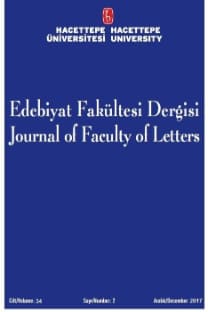Uncompromising Worldviews of Clarissa Dalloway and Septimus Smith in Virginia Woolf 's Mrs. Dalloway
Virginia Woolf'un Mrs. Dallooway Adlı Romanında Clarissa Dalloway ve Septimus Smith'in Uzlaşmyan Dünya Görüşleri
___
- Bloom, H. (1988). Virginia Woolf's Mrs. Dalloway. New York: Chelsea House.
- Colesworthy, R. (2014). 'The perfect hostess': Mrs. Dalloway, gift exchange, and the end of Laissez-Faire. Modernist Cultures, 9.2: 158-85.
- Dowling, D. (1991). Mrs. Dalloway: mapping streams of consciousness. Boston: Twayne.
- DeMeester, K. (1998). Trauma and recovery in Virginia Woolf's Mrs. Dalloway. Modern Fiction Studies, 44.3: 649-68.
- García, C. D. (2010). Decentring discourse, self-centred politics: radicalism and the self in Virginia Woolf's Mrs Dalloway. Journal of Spanish Association of Anglo-American Studies, 32.1: 15-28.
- Schwarz, D. (1995). The transformation of the English novel, 1890-1930. Hundmills: MacMillan.
- Stevenson, J. (1993). Women writers in English literature. Harlow: York.
- Woolf, V. (1989). Mrs. Dalloway. London: Collins.
- ISSN: 1301-5737
- Yayın Aralığı: 2
- Başlangıç: 1983
- Yayıncı: Emine Erdoğan Özünlü
Siyasi Parti Başkanı, "Sosyalizm ve Sanat" Makalelerinin Yazarı Ressam Namık İsmail
Decadence of Victorian Masculinity, or Dandyism in Oscar Wilde's Lady Windermere's Fan
Türkiye Sanat Tarihinde Dönemler
Osmanlı İskân Tarihine Dair Önemli Bir Kaynak: Timar Ruznamçe Defterleri
Uncompromising Worldviews of Clarissa Dalloway and Septimus Smith in Virginia Woolf 's Mrs. Dalloway
From his Doctoral Thesis to The Fall: Evil through Albert Camus's Eyes
Eda KARACAN, Rahşan BEKTAŞ BALAMİR
Medieval Literary Representations of the Victimized Children in Middle English Metrical Romances
Anzaklar ve Çanakkale: Anzak Günlüklerindeki Gerçekler
Hollanda'da Yaşayan Türklerin Geri Dönüş Konusundaki Niyetleri
